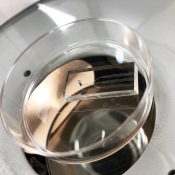Poised to increase in vitro fertilisation (IVF) treatment success rates, a team of pioneering Australian researchers have developed an automated microfluidic platform to standardise complex IVF processes.
In Australia alone, one in six couples is affected by infertility problems. In vitro fertilisation (IVF) is the most effective assisted reproductive technology, used to help couples with fertility issues

and assist with conception. After embryologists or medical laboratory scientists fertilise eggs with sperm in a laboratory petri dish, the fertilised egg is grown in culture for 2-6 days before being transferred into the uterus. IVF is a long and expensive process with a low overall success rate of only 18%. With only one in five harvesting cycles resulting in success, IVF requires multiple attempts, financial security, emotional toughness and years-long patience.
Although IVF is a long-established treatment, the techniques used in the procedure have changed little since the first successful IVF birth in 1978. Couples should be afforded equal opportunity for treatment; however, success rates depend heavily on clinic selection. While IVF clinical and laboratory procedures are standardised, there is wide disparity in success between different fertility clinics. Operator handling of the embryos during fertilisation and throughout the subsequent culturing process can be damaging to the embryos. Even slight variability in how laboratory procedures are performed and how embryologists handle these precious cultures greatly influences the final outcomes.
Adelaide University PhD candidate Suliman (Suli) Yagoub, a member of the Centre for Nanoscale BioPhotonics’ Reproductive Success team, worked in partnership with researchers from RMIT University and with support from ANFF-SA to design and fabricate a novel embryo housing device for use by embryologists. Mr Yagoub and his colleagues aimed to increase the overall success rate of IVF and to reduce the disparity among clinics by removing the variability resulting from human handling of the embryos.
Their platform supports a standardised, yet dynamic system, enabling embryologists to culture embryos to the desired stage of development using a computer-monitored microfluidic pump to control the microenvironment. Operators handle embryos only when initially placing fertilised eggs into the device and removing developed embryos when ready for implantation. Growth media is continuously delivered to the embryos, with culture conditions monitored by computer, removing possible operator variability or error in embryo handling and culture maintenance. The device can be modified to house a variable number of embryos, with the ability to control the microenvironment for each embryo. In addition, the device itself can be cryogenically stored, allowing cryopreservation of eggs or embryos without the need for any additional handling.
Using an individualised, customised platform for each client requires the ability to develop high-throughput printing and fabrication methods for these micro devices. In July 2019, Suli attended ANFF-SA’s Microengineering Winter School where he participated in lectures and practicals to enhance his understanding of micro- and nanofabrication before undertaking training in microfabrication with the ANFF-SA team.
Combining reproductive biology, physics, chemistry and engineering, Suli’s multidisciplinary research requires him to think outside the box. ANFF-SA has supported his research with one-on-one training with highly skilled staff and access to the cleanroom to fabricate his own prototype microfluidic devices. He credits his improved skills in microfluidics, fabrication and 3-D modelling to ANFF-SA’s staff who ‘have supported me with my designs, provided insightful advice that allowed my research to progress faster than anticipated and made sure I have access to all the resources available for me to get the best results.’
Suli Yagoub’s research in the Reproductive Success team will benefit IVF centres around the world by increasing the success rate of IVF and reducing the psychological and financial costs on would-be parents, who are increasingly relying on IVF to start a family.

